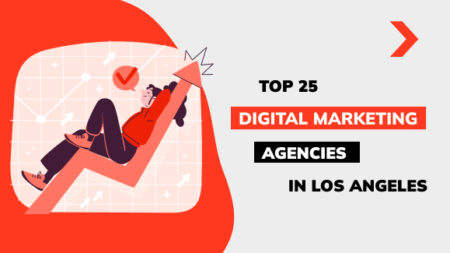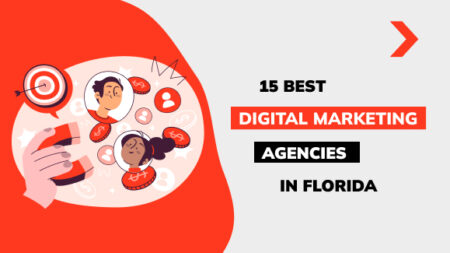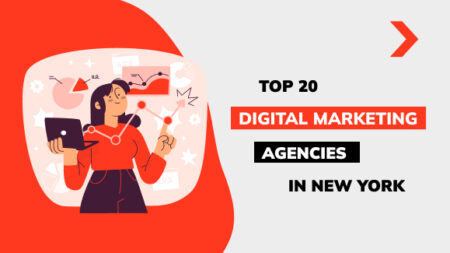B2B Digital Marketing
Today, business promotion is carried out through the digital marketing B2B model. This involves marketing products, goods, and services to other businesses, brands, organizations, and companies through various online channels. With thoughtful, clear, and structured B2B marketing strategies, businesses can improve their visibility on the internet and enhance their recognition. Additionally, by implementing relevant B2B marketing trends, they can generate more organic traffic, qualified leads, and conversions.

What Is B2B Digital Marketing?
Modern B2B marketing is one of the best ways to promote and boost sales of virtually any goods, services, or products among the target audience. The use of tools enables B2B companies to achieve strong results upon the completion of a business project. Moreover, B2B marketing is a long-term digital marketing strategy aimed at increasing sales and revenue for a brand, enterprise, organization, or company, regardless of the niche, industry, or field of activity. Compared to B2C marketing, B2B is more focused on interactions between commercial entities, which is why it’s important not to confuse B2C marketing with the B2B model.

How B2B Marketing Differs from B2C Marketing
These two types of digital marketing differ not only in target audience but also in strategic approach, communication style, and sales cycles in the online space. In the B2B model, the focus is on logic, facts, and long-term benefits, as decisions are made by the B2B marketer and often require additional approval from the team involved in the business project’s promotion. Trust, expertise, and personalized offers are crucial here. Meanwhile, B2C marketing is focused on emotions, quick conversion, and a broad audience. The goal is to attract and persuade B2C customers to make a purchase here and now.
Key Benefits of B2B Digital Marketing
Digital marketing opens up new opportunities for growth and development for B2B companies. Brands can strengthen their market positions, build strong partnerships, and more. One of the main key benefits is precise targeting. Thanks to analytics, it’s possible to track the behavior of potential clients and tailor the digital marketing strategy to their interests. Automation will increase the efficiency of customer interactions, while businesses will experience increased brand awareness, improved lead quality, faster sales cycles, and a higher return on investment in the project.
What are B2B digital marketing strategies?
B2B digital marketing plans and strategies are a set of online tools aimed at attracting and retaining corporate clients, as well as significantly increasing a brand or company’s profit. The main tactics, practices, web technologies, and methods that work in practice for promotion include content marketing (cases, research), SEO, LinkedIn promotion, email marketing (newsletters), PPC advertising, social media marketing, process automation, webinars, and retargeting. In B2B, the focus is on rationality, product value, and long-term relationships. Successful B2B marketing campaigns are built on analytics, a deep understanding of business needs, and precise segmentation of the target audience.

Defining Your Target Audience
This refers to the process of identifying the group of people most interested in a specific product or service offered by the business. The process involves analyzing demographic characteristics (age, gender, location, income, marital status), psychographics (interests, values, behavior, lifestyle), and behavioral factors (how and where people buy a certain B2B product, what purchasing habits they have, etc.). This step helps focus marketing efforts on those most likely to become real customers for the business.
Creating a B2B Buyer Persona
A B2B buyer persona is a detailed profile of the ideal business customer. It includes demographic, behavioral, and psychographic data to understand their pain points, goals, and decision-making processes. By creating the most accurate B2B buyer personas, businesses can tailor B2B digital marketing strategies, messages, and solutions that meet specific business needs, ultimately improving lead generation and conversion.
Market Research for B2B and B2C Audiences
Market research in digital marketing is necessary to understand both B2B and B2C audiences. It involves collecting data on consumer behavior, preferences, and marketing trends to make informed decisions. For B2B, it focuses on factors such as company size, industry, and decision-making processes. In B2C, it targets individual behavior, needs, and purchasing motivation, ensuring that online marketing strategies are relevant and effective.
Understanding the Customer Journey
The customer journey, simply put, is the path that a potential customer takes from awareness to the purchase of a product or service. Understanding this journey helps companies, organizations, and businesses determine how customers interact with the business at each stage. By identifying touchpoints and pain points, businesses can provide personalized content and experiences, increasing customer satisfaction and fostering more successful conversions throughout the decision-making process.
Content Marketing Strategies
To attract potential clients, a powerful content marketing strategy is essential. By providing valuable content, companies, brands, and businesses can build trust, establish authority, and drive traffic. Effective content marketing requires a combination of tactics, practices, and methods, including blog posts, social media platforms, newsletters marketing, and videos, to create a comprehensive marketing approach.

Effective Content Types for B2B Companies
For B2B brands, content types such as whitepapers, case studies, webinars, and e-books are necessary for building trust and demonstrating expertise. These content types allow companies, businesses, and organizations to provide in-depth knowledge and solutions tailored to their audience. Informative blog posts, industry reports, and success stories from B2B customers also help to foster relationships and generate leads.
Maintaining Content Consistency
Consistency in content creation is key to building a strong brand presence online. Maintaining a regular publishing schedule and ensuring that the content aligns with the business’s voice and brand values helps build trust with a specific audience. Content consistency also enhances SEO, increases engagement, boosts B2B sales, and ensures that a business’s messages remain relevant across all platforms.
Optimizing for SEO
SEO optimization is crucial for improving a business website’s visibility in search engines and attracting targeted traffic. By implementing effective on-page and off-page techniques (such as link building, newsletter marketing, and social media marketing engagement), optimizing for mobile, ensuring high performance, and focusing on local SEO, companies can improve their online presence, attract potential clients, and increase conversion rates.
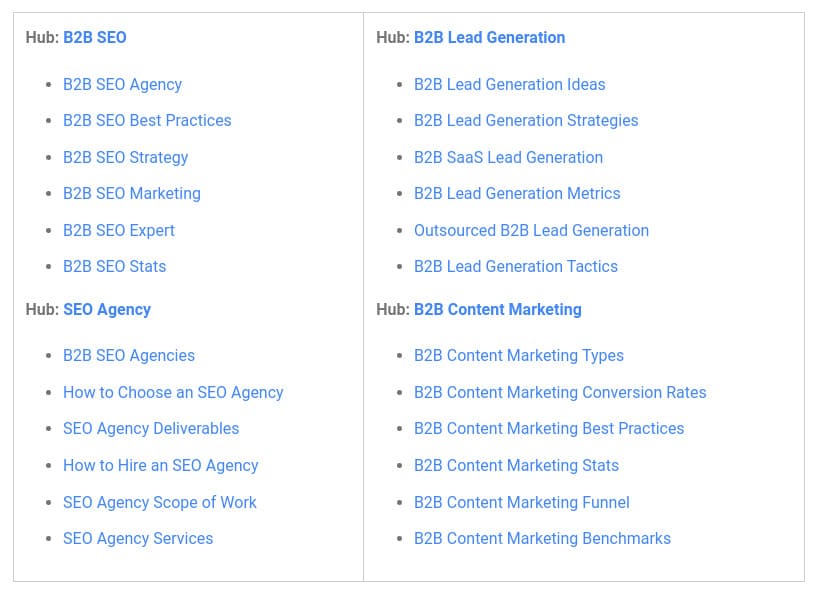
On-Page Optimization Techniques
This tactic involves optimizing individual web pages to achieve higher rankings in search results. This includes optimizing title tags, meta descriptions, headers, content, and, of course, images and illustrations. Additionally, using relevant keywords, enhancing internal linking, and ensuring user-friendliness and content value can help businesses improve search engine rankings and engage online users.
Off-Page Optimization and Link Building
This important practice focuses primarily on off-site strategies, particularly link building. Earning high-quality backlinks from authoritative, well-known, and popular web sources signals to search engines that a business’s content is trustworthy and authoritative. Social platform promotion, influencer collaboration, and content marketing are other tactics for enhancing off-page SEO optimization and boosting domain authority.
Technical SEO for B2B Sites
This optimization method focuses on improving the technical aspects of a brand’s or company’s website to enhance crawling and indexing by search engines. For B2B websites, this includes optimizing site architecture, ensuring correct URL structure, fixing broken links, using XML sitemaps, and improving website security (SSL certificates). A technically sound website improves user experience and search engine rankings.
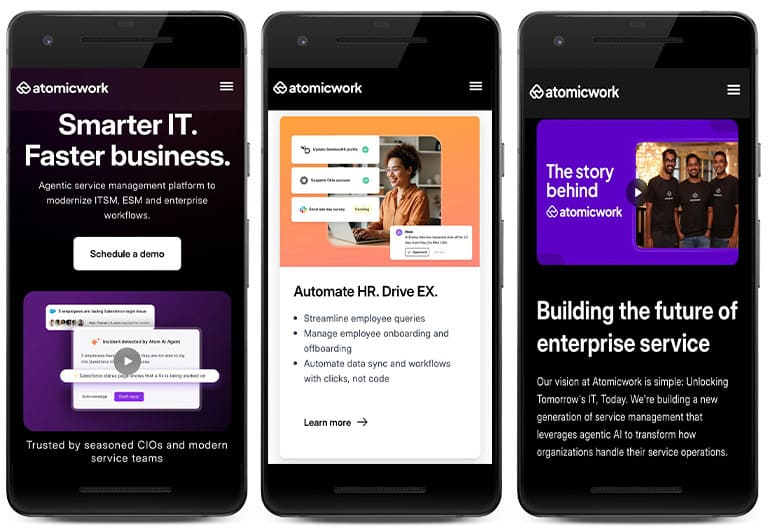
Mobile-Friendliness and Responsiveness
With the rise of mobile device usage, optimizing websites for mobile is essential for any business. Mobile-friendliness and responsiveness ensure that a website adapts to different screen sizes and devices, providing a seamless user experience. Google also considers mobile compatibility as a ranking factor, so companies must prioritize mobile optimization to stay competitive in search results.
Website Speed and Performance
The speed of a business website directly impacts user experience and SEO performance. Slowly loading web pages can lead to high bounce rates and lower rankings. Optimizing images, and photos, using content delivery networks (CDN), minimizing code, and utilizing caching can significantly improve page load times. Fast websites not only enhance SEO but also improve user satisfaction and engagement.
Local SEO for B2B Businesses
This type of service is essential for companies and businesses targeting local customers. For B2B brands, local SEO optimization involves setting up Google My Business, managing local citations, and targeting location-based keywords. Local SEO helps organizations and businesses appear in local search results and on online maps, making them more visible to nearby customers who are searching for specific services or products.
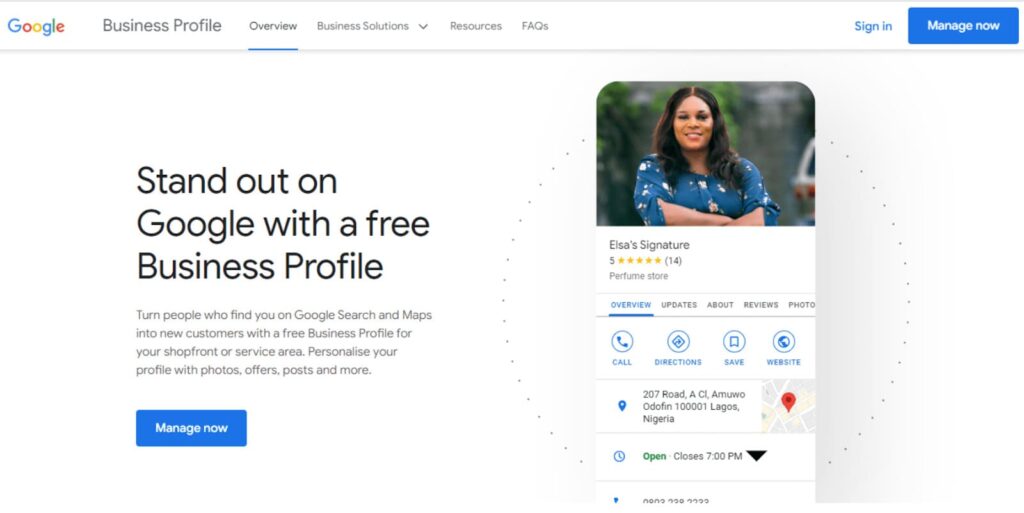
Measuring and Analyzing SEO Performance
This practice involves tracking various metrics to determine the success of a business’s optimization marketing efforts. Key metrics include organic traffic, bounce rates, conversion rates, keyword rankings, and backlinks. Using tools such as Google Analytics and Google Search Console can provide valuable insights, helping companies, enterprises, or organizations refine their SEO strategies to achieve the best results.
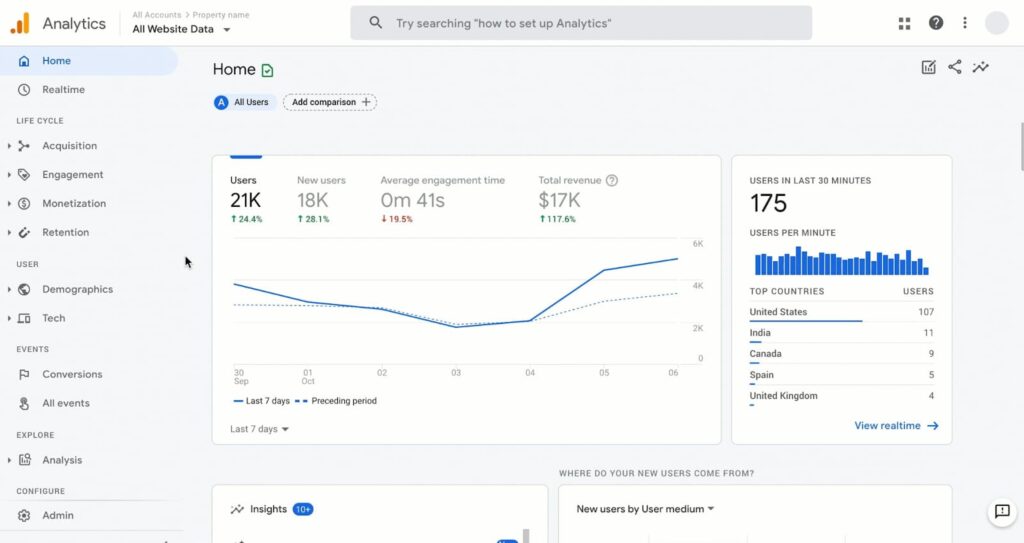
Social Media in B2B Marketing
Modern, popular, and relevant social media plays an important role in B2B decisions, providing a platform for companies and brands to engage with potential clients, partners, and industry influencers. They allow organizations and businesses to build relationships, share thought leadership, and increase brand awareness, ultimately leading to lead generation and business growth.
Effective Platforms for B2B Marketing
For B2B model marketing, LinkedIn, Twitter, and Facebook are the primary web platforms to reach decision-makers and industry professionals. LinkedIn excels in establishing professional connections, while Twitter provides quick updates and industry discussions. Facebook’s advertising targeting also helps businesses find a specific B2B audience, making it a key tool for increasing brand awareness.
Crafting Engaging Social Content
Creating valuable, informative, and engaging social content for a B2B audience involves understanding their pain points, providing valuable insights, and positioning the brand as an industry leader. Visuals, informative posts, case studies, and customer testimonials can effectively capture attention. Regularly sharing valuable content encourages engagement, builds trust, and fosters long-term business relationships.
Email Marketing for B2B Success
Using this powerful tool for B2B businesses allows direct communication with potential and existing clients. By sending targeted personalized messages, companies and brands can build trust, nurture relationships, and drive conversions. A well-executed newsletter marketing campaign helps increase brand awareness, engagement, and, ultimately, sales growth.
Building and Segmenting an Email List
Creating a targeted email list is key to the success of B2B email marketing. Businesses should start by collecting contacts through lead generation strategies, such as offering valuable content or hosting webinars. Once a company has a list, it should segment it based on factors such as industry, company size, or job position. This ensures more personalized communication, leading to higher engagement rates and conversion rates.
Creating High-Converting B2B Email Campaigns
To create high-converting email campaigns, businesses should focus on providing value to their recipients. It’s important to use compelling subject lines, personalized content, and clear calls to action. Emphasizing how a product or service solves specific business problems is crucial. Conducting A/B testing of campaigns, tracking open and click-through rates, and adjusting strategies to continually improve performance and return on investment (ROI) are essential.
Leveraging Marketing Automation
Marketing automation simplifies and optimizes marketing tasks, increasing efficiency and scalability. By using automation tools, businesses can streamline lead generation, nurture customer relationships, and boost engagement. Automation enables more targeted campaigns, personalized experiences, and revenue growth through data-driven solutions.
Key Tools and Technologies for Marketing Automation
Various marketing automation tools, such as HubSpot, Marketo, and Pardot, help brands and companies automate marketing workflows, manage campaigns, and track customer interactions. These technologies ensure seamless communication across different channels, such as email, social platforms, and web sources, helping businesses improve lead management and optimize marketing decisions for better results.
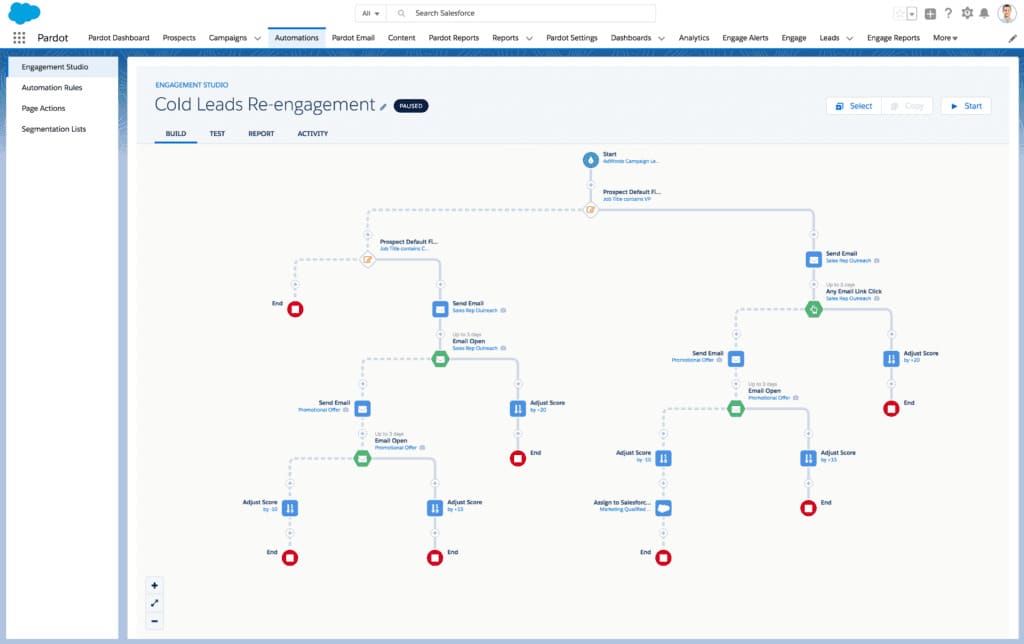
Automating Lead Generation and Nurturing
To generate and nurture leads, automation through CRM and marketing automation web platforms is necessary. These tools capture leads via forms and landing pages, segment them based on behavior, and trigger personalized follow-up actions. Automated workflows ensure timely communication and effective lead nurturing, and guide leads through the sales funnel toward conversion.
Email Marketing Automation for Better Engagement
This practice is key to increasing customer engagement. By segmenting email lists and setting up personalized drip campaigns, modern businesses can deliver relevant content at the right time. Automation ensures consistency, improves open rates, and boosts conversions by sending targeted messages tailored to individual customer needs and behaviors.
Using AI and Machine Learning
Today, AI and machine learning enhance marketing automation by providing predictive analytics, dynamic content delivery, and personalized recommendations. These technologies help brands and companies analyze vast amounts of customer data, predict future behaviors, and optimize campaigns for better targeting, ultimately increasing engagement and improving conversion rates.

Personalization and Customer Journey Optimization
Marketing automation allows modern businesses to create personalized experiences by tracking customer behaviors and preferences. By automating the delivery of personalized content, brands and companies ensure that customers receive the right message at each stage of their journey, improving satisfaction, building trust, and fostering long-term customer loyalty and conversions.
Analyzing Performance Metrics and ROI
Proper analysis of performance metrics and ROI is crucial for measuring the success of all marketing automation efforts. Using analytical tools, businesses can track key performance indicators (KPIs), such as lead conversion rates, email engagement, and revenue growth. These insights help optimize strategies, refine campaigns, and ensure better ROI on marketing investments.
FAQ
Who is B2B marketing intended for?
This type of marketing is aimed at businesses or organizations that sell goods or services to other businesses, rather than to individual consumers.
What does a B2B marketer do?
A B2B marketer is responsible for promoting products and services among other companies and brands, developing strategies for building relationships, attracting potential clients, and driving sales within the B2B model.
What is an example of B2B marketing?
A successful example of B2B marketing is a software development company that sells corporate solutions, such as CRM systems or project management tools, to other organizations, brands, and businesses.
What are the most effective B2B marketing strategies for generating high-quality leads?
Effective lead generation strategies in the B2B segment include implementing quality content, SEO, email solutions, account-based marketing (ABM), and leveraging social platforms such as LinkedIn.
What marketing trends should B2B companies prioritize to stay competitive in 2025?
B2B brands should focus on personalization, AI-driven analytics, video marketing, and building trust through transparency. Sustainability and customer-centric approaches will also be key to maintaining competitiveness.


